Sermons with Boats in Them #2: ‘Dark Night was the Night and the Sea was a Fury – Tempestuous, Turbulent and Threatening.’
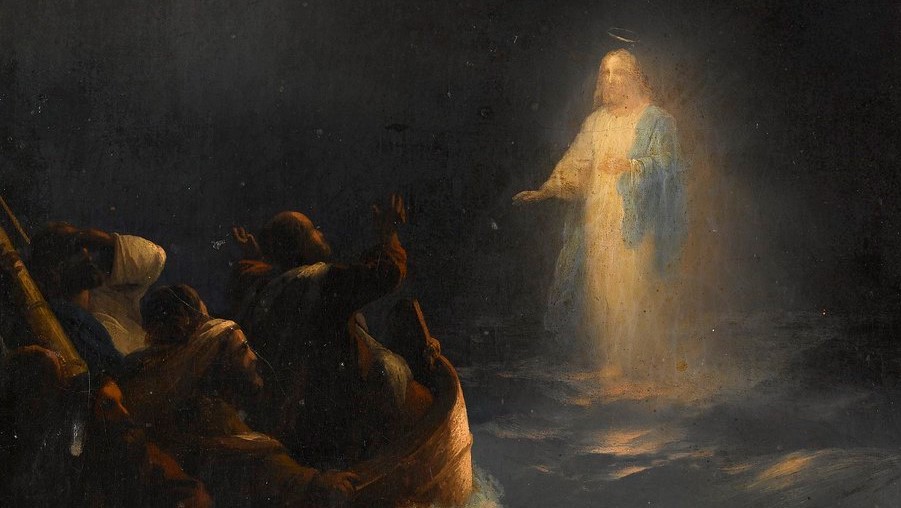
by Pastor Gene
Worship
Let’s begin with a song of worship that could not possibly be more relevant to our current situation.
I’ve printed out the words for you because I don’t want you to miss a single one. It’s Praise the Lord performed by the Imperials.
Praise the Lord
by Elliott B. Bannister / Michael Vincent Hudson
When you’re up against a struggle that shatters all your dreams
And your hopes have been cruelly crushed by Satan’s manifested schemes
And you feel the urge within you to submit to earthly fears
Don’t let the faith you’re standing in seem to disappear
Praise the Lord, He can work through those who praise Him
Praise the Lord, for our God inhabits praise
Praise the Lord, for the chains that seem to bind you
Serve only to remind you that they drop powerless behind you
When you praise Him
Now Satan is a liar and he wants to make us think
That we are paupers when he knows himself we’re children of the King
So lift up the mighty shield of faith for the battle must be won
We know that Jesus Christ has risen so the work’s already done
Praise the Lord, He can work through those who praise Him
Praise the Lord, for our God inhabits praise
Praise the Lord, for the chains that seem to bind you
Serve only to remind you that they drop powerless behind you
When you praise Him
Introduction
1) If I were going to write a ghost story that had a boat in it, I might start it like this: Dark was the night and the sea was a fury – tempestuous, turbulent and threatening.
It might be a good way to begin a story about the current crisis that our nation finds itself in!
It is a VERY dark night right now. The sea is a fury – tempestuous, turbulent and threatening worse! Furthermore, many of the sailors are all affright – frozen in terror over what the near future might hold!
2) But true as that all is, these kinds of circumstances are nothing new to the Church!
In fact, the history of the Church is a catalogue of persecution, plague and harassment.
We’ve been attacked from within and without.
From within, Heretics have tried their best to contaminate the pure doctrine of the Church since the first century – and they’ve rarely been as successful as they are today!
From without, the Church has had to deal with opposition ranging from harassment to all out systematic persecution by whole national governments.
China, Russia and other communist countries come immediately to mind;
Imperial persecution by Nero, Diocletian and Decius do too;
Dictatorial regimes like as North Korea, Romania under Nicolae Ceaușescu, and Sudan’s president Omar al-Bashir illustrate the point;
And this is not to mention the continual mistreatment of believers through the Muslim world: Afghanistan, Algeria, Bangladesh, Chad, Egypt, Indonesia, Iran, Iraq, Malaysia, Nigeria, Pakistan, Saudi Arabia, Somalia, Sudan, Syria, Turkey and Yemen – and those are the most egregious offenders!
Oh yes, Church, followers of Jesus are used to ‘dark and stormy nights’!
And besides all that, we’ve also had to endure the same troubles that our neighbors have had to endure – things that are common to all men – depressed economies and war and, yes, even plague.
It’s an interesting study though that there has always been a marked difference between the Christian response to such hardships and the secular one.
While the secularist has weathered the crisis with eyes looking in – eyes on self – true believers have faced it with eyes on Jesus, and, because we see Him, eyes on others.
In Mark 12:28-34, “one of the scribes came up” to Jesus and asked Him:
“Which commandment is the most important of all?” Jesus answered, “The most important is, ‘Hear, O Israel: The Lord our God, the Lord is one. 30 And you shall love the Lord your God with all your heart and with all your soul and with all your mind and with all your strength.’ 31 The second is this: ‘You shall love your neighbor as yourself.’ There is no other commandment greater than these.”
The scribe recognized Jesus’ wisdom. He replied,
“You are right, Teacher. You have truly said that He is One, and there is no other besides Him. 33 And to love Him with all the heart and with all the understanding and with all the strength, and to love one’s neighbor as oneself, is much more than all whole burnt offerings and sacrifices.”
And hearing this, Jesus looked at the man and gave this stunning reply:
He said to him, “You are not far from the kingdom of God.” And after that no one dared to ask him any more questions.”
Love God and love your neighbor – they’re two sides of the same coin, right?
The Apostle John wrote: “If anyone says, “I love God,” and hates his brother, he is a liar; for he who does not love his brother whom he has seen cannot love God whom he has not seen. 21 And this commandment we have from him: whoever loves God must also love his brother” (1 John 4:20-21).
This is precisely why believers have always faced crisis differently than secularists have.
The secularist faces the trial with fear, the believer with faith.
Where the secularist sees only trouble and despair, the believers sees an opportunity to share Christ with terrified sailors, to speak light into the darkness, to be a lighthouse!
Anyway, dark was the night and the sea was a fury – tempestuous, turbulent and threatening.”
The Bible has some ghost stories in it.
And one of them even includes (1) a dark night, (2) a tempestuous sea, (3) terrified sailors and, most importantly, (4) a boat!
The First Boat, Redux
1) Last week we looked at Mark 4:35-41: “On that day, when evening had come, He said to them, “Let us go across to the other side. And leaving the crowd, they took Him with them in the boat, just as He was. And other boats were with Him. And a great windstorm arose, and the waves were breaking into the boat, so that the boat was already filling. But he was in the stern, asleep on the cushion. And they woke him and said to him, “Teacher, do you not care that we are perishing?” And He awoke and rebuked the wind and said to the sea, “Peace! Be still!” And the wind ceased, and there was a great calm. He said to them, “Why are you so afraid? Have you still no faith?” And they were filled with great fear and said to one another, “Who then is this, that even the wind and the sea obey him?”
The Greek literally says that a “great windstorm of wind” arose (λαῖλαψ μεγάλη ἀνέμου).
As is typical for Mark, his description is vivid: ‘the waves are [imperfect active indicative] breaking into the boat,’ so much so that ‘the boat is [present passive infinitive – the boat ‘kept on receiving the action of being filled’] already filling’ up!
2) Jesus was sleeping because He was perfectly resting in the Father.
Why was Jesus asleep? The obvious implication is that He could rest easily because He was completely resting in His Father. As Proverbs 3:24 promises …
“If you lie down, you will not be afraid;
when you lie down, your sleep will be sweet.”
3) In the Bible, and also in all ANE religious and mythological thinking, only God commands the wind and the waves. Yet Jesus speaks and the wind and the waves obey Him! At the Lord’s command, the “great windstorm” became a “great calm” – and, O, how we need a great calm today!
We need a calm in our nation, and we need a calm in our hearts.
4) We saw that the “bad” fear that the disciples had – fear of the storm – was replaced by a “good” fear – the fear of the Lord.
The fear they had of the storm was a ‘δειλός fear’ – actually, timidity or cowardice.
The fear they had of the Lord (after watching Him still the sea) was a ‘φόβος fear’ – a genuine reverential terror that comes from realizing that we’re in God’s presence.
I called this an ‘Isaiah 6 fear’ – a deep, trembling reverence for the Lord that catapults us into action – that makes us evangelists – that compels us to tell everyone we know about the God whom we’ve encountered!
And, O, how we need this reverence right now, Church!
Our nation needs evangelists and witnesses for the Lord, laborers for Jesus who see the harvest and set out to bring it into His barn.
Let it be me, Lord!
5) Finally, the promise for our present storm:
In John 14, the Lord Jesus is going away. He’s about to be crucified and killed. What does He say to His disciples?
“Peace I leave with you; my peace I give to you. Not as the world gives do I give to you. Let not your hearts be troubled, neither let them be afraid” (John 14:27).
It’s a promise for us in this very hour, Church – if we’ll receive it! Jesus offers to give us HIS very peace, a peace greater than any doctor or politician could give. The storm is over. If we want it.
A Second Boat
This brings us to another wonderful New Testament story that has a boat in it – but this one has a ghost too!
1) Let’s set the context.
As we come to this story, Jesus has just fed 5000 people with a few fish and a few loaves of bread. Want people to follow you around? Do that!
This miraculous feeding is one of the most important events in the ministry of Jesus and it’s highly symbolic. Its mentioned in all four Gospels – a rarity. We will study it carefully when we get back to John, but suffice it to say it is loaded with important lessons – not the least of which is: The Lord cares deeply about the physical needs of people.
Well, our new boat story picks up immediately following this miraculous feeding (Matthew 14, Mark 6 and John 6 have the same sequence).
2) Mark 6:45-46: “Immediately He made His disciples get into the boat and go before Him to the other side, to Bethsaida, while He dismissed the crowd. And after He had taken leave of them, he went up on the mountain to pray.”
So, right after the feeding of the multitudes, Jesus decided to send the disciples away and to retreat for some time to pray.
There is quite a bit of debate about where Jesus sends them off to here – I’m not going to get into ‘why’ here, but we’ll look at it carefully when we get to John’s version of the event in the future.
Jesus most likely “sent his disciples ahead of Him to nearby Bethsaida, “while He dismissed the crowd” (ἕως αὐτὸς ἀπολύει τὸν ὄχλον). He planned to meet them there, but if He was delayed, they were to embark westward toward Capernaum and Gennesaret … [This view explains] why the disciples were still in the middle of the lake hours later (6:48) … [T]hey first went to Bethsaida and waited several hours for Jesus. Only later, when Jesus was delayed on the mountain, did they embark toward Gennesaret.” [1]
So, after the disciples shoved off, Jesus apparently said goodbye (ἀποταξάμενος) to the crowds and retreated to the mountain to pray. There are several times in Mark where the writer records Jesus praying at night and alone (cf. Mark 1:35 and 14:35).
And so, Mark 6:46: “After he had taken leave of them, he went up on the mountain to pray.
3) Mark 6:47-48a: “And when evening came, the boat was out on the sea, and he was alone on the land. And He saw that they were making headway painfully, for the wind was against them.”
So, we have an interesting picture here: the disciples are on the sea in a boat and the Lord is on the land watching them!
They are struggling, “making headway painfully.” The NASB says they were “straining at the oars …” The NKJV has them “straining at rowing …”
John’s version of the story fills in a few details which help us to see why.
John 6:17b–18: “It was now dark, and Jesus had not yet come to them. 18 The sea became rough because a strong wind was blowing.”
– Or, literally, “It was already dark, and Jesus had not yet come to them. Then the sea, driven by a great wind, became very rough” (Bruner).[2]
In other words, ‘It was a dark and stormy night …’: awful conditions for sailing, but perfect conditions for a miracle!
“The sea, driven by a great wind, became very rough” it’s all there:
The darkness, the aloneness, the human struggle, the helplessness, four-miles out in the middle of the lake, the weariness (it’s after 3 in the morning), the wind – the wet wind – and the stormy swells. And, worst of all, no Jesus!
Dr. Bruner suggests that the Gospel records of this dark and dangerous situation point forward to the “seemingly God-forsaken experiences of the earliest Church amidst her hard and hard-to-understand persecutions.”[3]
I think there’s something to that. “It was a dark and stormy night…” And you know what? ‘It IS a dark and stormy night!’ for us right now!
We’re isolated. House-bound. The death toll is rising daily. Some of us have family members who’ve been infected with the virus. Some of us are in great risk because of our age and medical history. Some have lost their jobs – jobs which may not be there for when the dust settles. Some experts have suggested that we’ll still be dealing with this in July, or even August. Some have lost significant savings, stocks have plummeted as God has, once again, reminded us of the “uncertainty of riches.” There are shortages at the grocery store that have led some to hoard necessary products, keeping them from their neighbors who need them. Greed has driven some to seize an opportunity to enrich themselves on the misfortunes of their brothers and sisters and have inflated prices to turn a quick profit. And some, even Christians, have withdrawn to the shadows in fear.
Do you know what? The night is dark and the sea is a roiling tempest! And some have wondered where the Lord is in all of this.
But while the world watches on in amazement at the novelty of this current pandemic, plague and pestilence are nothing new to Christians!
A few weeks back, Lyman Stone, a former missionary to Hong Kong, wrote a wonderful piece reminding us to remember our Christian history because “Christianity has been handling epidemics for 2000 years”![4]
He writes …
Practical theology says care, sacrifice, and community are as vital as ever. The modern world has suddenly become reacquainted with the oldest traveling companion of human history: existential dread and the fear of unavoidable, inscrutable death. No vaccine or antibiotic will save us for the time being. Because this experience has become foreign to modern people, we are, by and large, psychologically and culturally underequipped for the current coronavirus pandemic.
To find the moral resources to tackle COVID-19, both its possible death toll and the fear that stalks our communities alongside the disease, we have to look at the resources built in the past. For me, that means examining how people of my tradition, Christians … have handled the plagues of the past. And while people of all faiths, and none, are facing the disease, the distinctive approach to epidemics Christians have adopted over time is worth dusting off.
The Christian response to plagues begins with some of Jesus’s most famous teachings: “Do unto others as you would have them do unto you”; “Love your neighbor as yourself”; “Greater love has no man than this, that he should lay down his life for his friends.” Put plainly, the Christian ethic in a time of plague considers that our own life must always be regarded as less important than that of our neighbor.
During plague periods in the Roman Empire, Christians made a name for themselves. Historians have suggested that the terrible Antonine Plague of the 2nd century, which might have killed off a quarter of the Roman Empire, led to the spread of Christianity, as Christians cared for the sick and offered a spiritual model whereby plagues were not the work of angry and capricious deities but the product of a broken Creation in revolt against a loving God.[5]
But the more famous epidemic is the Plague of Cyprian, named for a bishop who gave a colorful account of this disease in his sermons. Probably a disease related to Ebola, the Plague of Cyprian helped set off the Crisis of the Third Century in the Roman world.[6]
But it did something else, too: It triggered the explosive growth of Christianity. Cyprian’s sermons told Christians not to grieve for plague victims (who live in heaven), but to redouble efforts to care for the living. His fellow bishop, Dionysius, described how Christians, “Heedless of danger … took charge of the sick, attending to their every need” … [Yet] the sociologist and religious demographer Rodney Stark claims that death rates in cities with Christian communities may have been just half that of other cities.
He ends the article …
As the world belatedly wakes up to the fact that the age of epidemics is not over, these ancient ideas still have modern relevance.
I’ll say more about this in the future, but for now, just notice that in the story before us it was ‘a dark and stormy night,’ but Christianity is no stranger to dark and stormy nights!
The Puritan divine Matthew Henry wrote: “If we have received Christ Jesus the Lord, have received him willingly, though the night be dark and the wind high, yet we may comfort ourselves with this, that we shall be at shore shortly, and are nearer to it than we think we are.”[7]
4) Well, Mark 6:48b-50a: “And about the fourth watch of the night he came to them, walking on the sea. He meant to pass by them, 49 but when they saw him walking on the sea they thought it was a ghost, and cried out, 50a for they all saw him and were terrified.”
The Roman night watch was divided into four three-hour periods. Jesus came to them in the last of these, 3-6 A.M. So, the NIV, less interested, as it is, in ‘literalism,’ simply translates it, “Shortly before dawn.”
There’s something supernatural here besides the obvious walking on water: How did Jesus see them at night from the shore four miles out? Some have suggested, that there must have been some serious moonlight shining on the lake. I just see this as supernatural from stem to stern, as they say in sermons about boats! But either way, how He saw them seems like a very minor miracle compared to what comes next!
It simply says, “He came to them, walking on the sea” (Mark 6:48b).
Last week we saw Jesus still the wind and the waves by commanding them to be silent. We mentioned that all throughout the Bible – and all Ancient Near Eastern thought – ONLY God can command the wind and the waves.
But that’s exactly what Jesus did – and it terrified them. Well, Jesus is doing what Scripture declares only God can do!
Listen to Job 9:4-10, HCSB:
4 God is wise and all-powerful.
Who has opposed Him and come out unharmed?
5 He removes mountains without their knowledge,
overturning them in His anger.
6 He shakes the earth from its place
so that its pillars tremble.
7 He commands the sun not to shine
and seals off the stars.
8 He alone stretches out the heavens
and treads on the waves of the sea.
9 He makes the stars: The Bear, Orion,
the Pleiades, and the constellations of the southern sky.
10 He does great and unsearchable things,
wonders without number.
Do you see it in vs. 8b? “He alone … treads on the waves of the sea!”
The word “trample” here doesn’t mean merely “walking on the waves,” but “subduing the sea, or controlling it” as He does![8] We might even say, ‘stomping’ on the waves!
Furthermore, I should tell you that this is one of the strangest phrases in all of the Old Testament. Don’t believe me? Just you wait!
While the verb, ‘to tread,’ is clear enough, the phrase “waves of the sea” is NOT! The Hebrew phrase is pronounced bamotey yam!
Some believe this phrase is not referencing the sea at all, but is actually referencing Semitic mythology, where the YHWH is seen literally stomping (treads) on the back of Yamm (a Semitic sea god).[9]
That’s why, if you have a Good News translation, you’ll see verse 8b translated, “No one helped God spread out the heavens or trample the sea monster’s back!”
Just as the margin note for the NRSV says the phrase might also mean “trampled the back of the sea dragon.”[10]
Anyway, who is the ONLY One who can tread upon the sea? Walk on it? Stomp on it? Subdue it? God, of course!
And we have proof from archeology that that’s really what they thought!
Now, if you visit the Louvre, in Paris, you can see the astonishing, white limestone stele from ancient Ugarit (northwestern Syria) which is called Baal with Thunderbolt, or simply, the Baal stele.
It was discovered by French archeologist Claude Schaeffer in 1932. It depicts the Aramean Baal, the so-called ‘storm God’ WALKING ON THE WAVES!
(I have reproduced it for you on the next page.)
Do you see him walking on the water? Do you know why? Because in ANE thought, ONLY GOD COULD WALK ON WATER!
So floored were the disciples by this, that they couldn’t imagine this could be a person at all! They cried out a single word: “φάντασμα!” ‘It’s a phantom, a ghost, an apparition!’
They were terrified, another word for fear, closely related to φόβος, ταράσσω. It means to be alarmed, awed, frightened out of one’s wits, horrified, panic-stricken, petrified, scared stiff. So, Matthew 14:26-27 says, “they were terrified (ταράσσω), and said, “It is a ghost (φάντασμα)!” and they cried out in fear (φόβος).”
Can you understand why?
And one more thing about this passage” Mark mentions that Jesus “meant to pass by them” (Mark 6:48b).
This seems puzzling at first, until we bring the whole picture into view – and this is where things get really exciting for me!
To “pass them by” is actually the language of Old Testament theophany – the language of God appearing to people. By using it, Mark wants to conjure up the image of Moses in Exodus 33:18–23, when he asked YHWH, “Please show me Your glory.”
The Lord answered: “I will make all my goodness pass before you … But … you cannot see my face, for man shall not see me and live” … And the Lord said, “Behold, there is a place by me where you shall stand on the rock, and while my glory passes by I will put you in a cleft of the rock, and I will cover you with my hand until I have passed by.”
Do you see that? “Passed before/passes by/passed by”?
By using this phrase, Mark wants to conjure up the image of Elijah in 1 Kings 19:10-11, when YHWH tells the discouraged prophet to “Go out and stand on the mount before the Lord.” And “behold, the Lord passed by, and a great and strong wind tore the mountains and broke in pieces the rocks before the Lord …”
So, I think this is the best explanation of what’s happening here – and this seems to be the consensus among New Testament scholars.[11] Just as with Moses and Elijah, Jesus is revealing His true nature to His disciples by ‘passing them by.’ There are other explanations (three others!), but this is the one that rings most true to me because of what comes next!
5) Mark 6:50b-52: “But immediately he spoke to them and said, “Take heart; it is I. Do not be afraid.” 51 And he got into the boat with them, and the wind ceased. And they were utterly astounded, 52 for they did not understand about the loaves, but their hearts were hardened.”
Notice what Jesus does here …
- He calls to them.
- He assures them that it’s He.
- He encourages them: “Take heart.”
- He calms their terror: “You must not be afraid” (imperative of φόβος).
- He joined them in the trial: “He got into the boat with them.”
- And when He climbed into the boat “the wind ceased” (or, maybe the just didn’t know it was blowing any longer!).
Isn’t this beautiful?
So, what do we have in this story with a boat in it?
We have a picture of the very presence of God here with His people – a theophany narrative.
And we have a picture of Jesus watching, seeing His children in trouble, and coming down to rescue them – a deliverance narrative.
And we see Jesus the Creator walking on the waves as though they were hills in the desert and silencing the blowing wind by simply joining His followers “in the boat,” in the trial – a sovereignty narrative.
But there’s one thing we DON’T have in this story, and it’s a doozey!
6) I don’t believe we have Jesus saying, “It is I” in verse 50! Remember our verse: “But immediately He spoke to them and said, “Take heart; it is I. Do not be afraid.”
NO! “Ἐγώ εἰμι· μὴ φοβεῖσθε” = “I AM, don’t be terrified!”
φοβέω, as we have seen, means to be in a state of deep apprehension; to be afraid or terribly frightened.[12]
He simply identifies Himself as “I AM!” Not “I am He,” nor “I am Jesus,” and not, “It’s me!” Just “Ἐγώ εἰμιε,” “I AM!” “I AM” has been the great divine Name ever since Moses’ experience at the Burning Bush (Exodus 3:14), and here Jesus claims the name for Himself.
It is full of majesty!
“I AM, don’t be terrified,” He says!
In our age of terror, “I AM, don’t be terrified,” is relevant.
In our age of coronavirus, “I AM, don’t be terrified,” is particularly relevant.
And it’s one thing for Him to say He is the “I AM,” but it’s quite another to prove it, which He has just done by exercising absolute power over the wind and walking on the waves!
B.F. Westcott points out that, “We must not think of [a] law [of nature] suspended, but of a new force called into exercise.”[13]
7) And there’s another miracle that happens here which only John tells us about.
“But he said to them, “I AM; do not be afraid.” 21 Then they were glad to take him into the boat, and immediately the boat was at the land to which they were going” (John 6:20-21).
When Jesus gets into the boat, they are FOUR MILES out from the shore! But, John writes, as soon as they “take Him into the boat” with them, “immediately the boat was at the land to which they were going.”
The spiritual lesson for us should be obvious: in the Christian life the journey is the goal.
Whenever we let Jesus into the boat, we’ve arrived at our destination. Jesus is our spiritual destination – the Gospel of John will teach s this lessen over and over again.
But the message that Jesus wants to convey here is easy to find: “I AM, don’t be terrified.”
Now one more thing this morning …
8) Mark ends his story with these words:
“And He got into the boat with them, and the wind ceased. And they were utterly astounded, 52 for they did not understand about the loaves, but their hearts were hardened” (Mark 6:51-52).
This is actually really sad. It says that they were “astounded” – ἐξίστημι – literally, ‘out of their senses’ about it. The word means to be in a state where everything seems to “make little or no sense,” amazed and confused.[14]
They were truly bewildered by this, but they didn’t have to be. You see Jesus had already taught them this lesson. He’d already shown them who He is. When? Just yesterday afternoon, when He multiplied the loaves and the fishes.
But, even though they’d witnessed this only 12 hours ago, the hardness of their hearts kept them from seeing who Jesus truly is. So, Mark says, “And they were utterly astounded.” Why? “[Because] they did not understand about the loaves, but their hearts were hardened.”
Jesus was in the boat with them, OK. But they never needed the boat to understand His true identity. The question is: has He shown us enough to believe it? Or are our hearts still too hard?
I believe that in many ways the current crisis our nation finds itself in will tell on us! It will shake everything up, so that only what’s important remains. It will reveal to ourselves – and in some cases to others – whether or not we’ve learned the lesson of the loaves – who it is who really provides our bread. If we have learned the lesson the results will be obvious: we’ll proclaim Jesus to every weary soul who needs to know Him!
[1] Strauss, Mark L., Mark: Zondervan Exegetical Commentary on the New Testament (Grand Rapids, MI: Zondervan, 2014), pp. 284–290.
[2] Bruner, Frederick Dale, The Gospel of John: A Commentary (Grand Rapids, Michigan: Willian B. Eerdmans Publishing, 2012) ad loc.
[3] Ibid., ad loc.
[4] Stone, Lyman, Christianity Has Been Handling Epidemics for 2000 Years, Foreign Policy, 3.13.2020, italics mine; https://foreignpolicy.com/2020/03/13/christianity-epidemics-2000-years-should-i-still-go-to-church-coronavirus/
[5] Yeomans, Sarah K., Classical Corner: The Antonine Plague and the Spread of Christianity, Biblical Archaeology Review, March/April 2017; https://www.biblicalarchaeology.org/daily/ancient-cultures/daily-life-and-practice/the-antonine-plague-and-the-spread-of-christianity/
[6] Lynch, Patrick, 4 Reasons Why Third Century Rome Was in Crisis – And How it Was Fixed, History Collection; https://historycollection.co/4-reasons-third-century-crisis-rome-occurred-fixed/
[7] Henry, Matthew, John, vol. 5 in Matthew Henry’s Commentary on the Whole Bible (1714, 1721), ad loc.
[8] Reyburn, William David, A Handbook on the Book of Job: UBS Handbook Series (New York: United Bible Societies, 1992), p.183.
[9] Clines, David J.A., Job 1–20: Word Biblical Commentary, Vol. 17 (Waco, Texas: Word, 1989) pp.230-31.
[10] The Holy Bible: New Revised Standard Version (Nashville: Thomas Nelson Publishers, 1989) Job 9:8b, footnote.
[11] Lane, Mark, 236; Guelich, Mark 1:1–8:26, 350; Garland, Mark, 263–64; Marcus, Mark 1–8, 426; Stein, Mark, 325; Collins, Mark, 334, etc.
[12] Arndt, W., Danker, F. W., Bauer, W., & Gingrich, F. W., A Greek-English Lexicon of the New Testament and other Early Christian Literature (Chicago: University of Chicago Press, 2000) 3rd ed., pp. 519–520.
[13] Westcott, B. F., John, 2 vols. (1880; 1908) 1:217.
[14] Arndt, W., Danker, F. W., Bauer, W., & Gingrich, F. W., A Greek-English Lexicon of the New Testament and other Early Christian Literature (Chicago: University of Chicago Press, 2000) 3rd ed., pp. 519–520.
Recommended Posts
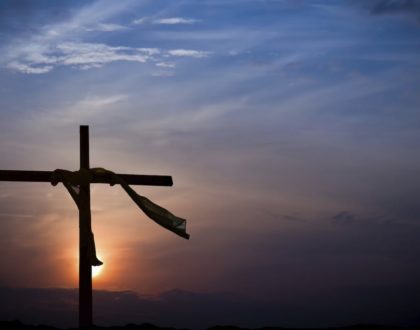
Resurrection Sunday
April 17, 2022

Harvest Talk for Harvest’s People
October 10, 2021
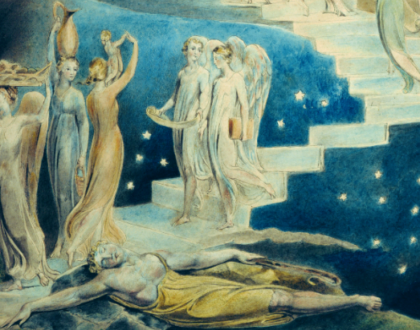
The Long Road Back to Bethel
July 25, 2021
Comments
Comments are closed.


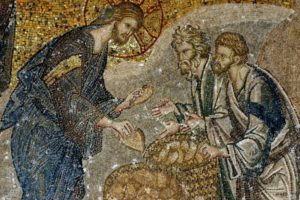
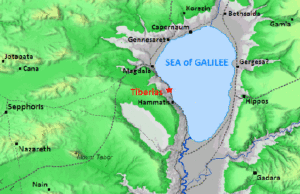
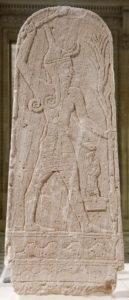
WE should not be afaid because we have JESUS IN OURLIFES IAM BLESSED BECAUSE I HAVE HIM IN MY LIFE I LOVE JESUS HE IS ALWAYS THERE FOR ME .I AM THANKFULL THA TI HAVE HIM INMYLIFE .